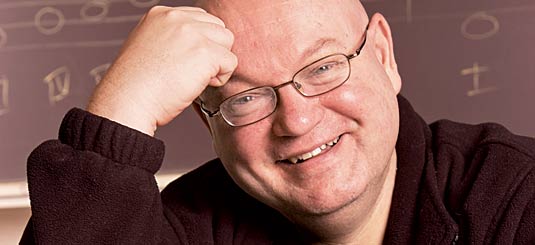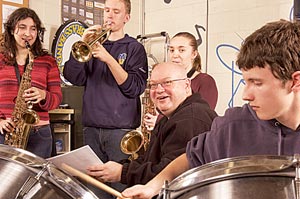
Prime Minister's Award winners:
Carolyn Wilson in Stratford
Mark Robbins in Barry's Bay

Strike up the bands!Prime Minister's Award winner Mark Robbins makes learning fun by encouraging student leadership in a state-of-the-art, community-oriented music program at Madawaska Valley District High School in Barry's Bay – east of Algonquin Park. |
Two years ago 18-year-old Sufi Abbaspour lived in the cosmopolitan city of Zurich.
Now living in the tiny community of Barry's Bay in the Ottawa Valley, Abbaspour attends a high school with 500 other students and couldn't be happier. She is leading the school's Junior band and planning to study music at York University next year.
She says she will remember and be inspired by music teacher Mark Robbins for the rest of her life.
Keeping it fun
While rigour, discipline and high expectations are the norm in Mark Robbins's music classes, he claims that he is easily bored and “I like to spice things up and have fun with my students.”
Fun is an underlying principle for Robbins and the atmosphere he creates in his classroom is a casual one. His students address him by his first name and joke around with him as if he were a peer.
“Mark isn't just our teacher,” says Philip Quade. “He's a friend. He's always there for us when we need advice. He treats every one of his students with the utmost respect and is always willing to go above and beyond to help.”
Robbins may not be just a teacher to his students at Madawaska Valley, but he is their only music teacher. Students are drawn from one of the province's largest districts – many riding an hour each way by bus. More than 150 are enrolled in music courses at the school and the majority of Grade 9 students have had no previous music instruction. And as any teacher knows, it takes creativity and energy to keep 30 or more music students engaged for 75 minutes.
At Madawaska Valley the music program is not strictly about playing in the band or being part of an ensemble. Students in Grades 10 through 12 also have the option of working at their own pace and ability in an independent self-study guitar and keyboard class. They must own their instrument and be willing, with Robbins's help, to develop their own programs and to practise outside of school.
 |
Digital-interface technology and high-tech recording equipment broaden opportunities for musical education. |
Robbins has also introduced music-instrument digital-interface technology. High-tech recording and mixing equipment enable students to explore how music is produced – in various senses of the word.
“The recording technology allows us to engage a wider variety of students,” he explains. “It's not just the performers we hook, it's also those interested in recording, mixing and producing music.”
Adding to each day's busy schedule, all extracurricular activities must take place during lunch and other non-class periods because so many students are bused. Considering the constraints, the extracurricular music program is impressively large and diverse. Around 200 participate in the school's extensive extracurricular music programs. There are Junior, Intermediate and Senior bands; all three perform throughout the year. There is also a brass band and there are choral, jazz, sax, trumpet, recorder and electronic ensembles.
Robbins's classroom literally hums every day at lunch as one or more of the many ensembles or combos practise. Several small, soundproof practice rooms and another large room are also occupied. Students take advantage of these spaces throughout a typical school day for practise and self-directed study, and it's impressive to see how on-task and focused they remain.
So how does Robbins manage all this activity?
Musical delegation
Developing student leadership is key. Robbins enlists students to run everything except the Senior band, brass, jazz and choral ensembles. For the bands he assigns sectional leaders who are often in charge of rehearsals.
Each semester Robbins offers three one-credit co-op placements. Grade 12 students compete to take on these positions, which give them responsibility for the time-consuming but vital work that supports the music program. While the positions clearly assist Robbins and help other music students, the core value lies in what they instill in the co-op students themselves.
As this year's music librarian, Ashley Prince catalogues and manages every piece of music for the bands, choirs and ensembles. She also maintains the department's web site and handles the logistics and scheduling for public performances.
“Students come to me for tutoring and other help,” says Prince. “This role has given me confidence and I believe the skills I have learned will help prepare me for the future.”
“Technology allows us to engage a wider variety of students.”
Philip Quade, this year's recording technician, looks after the electronic equipment – helping record and mix original student music for the school's annual CD and working as a peer tutor and assistant to Robbins. Quade is especially proud of the new electronic ensemble. After working for a year to assemble the necessary equipment and participants, the group is now creating, recording and producing original work.
“I have always performed in bands, both in and out of school,” says Quade. “But the electronic aspect has let me look further into possible music careers. The music program has definitely changed my life for the better and will continue to do so long after I leave.”
Sufi Abbaspour leads the Junior bands and assists in teaching a Grade 9 class. When she arrived at the school in 2004 she was surprised by the freedom and responsibility given to music students.
“It has built my confidence and helped with my career decisions,” she says. “For me, teaching has been the best way to learn.”
“Having these bright, talented and hard-working kids doing these important things lets me love coming to work every day,” says Robbins. He clearly appreciates the help: “Students don't bug me about losing their reed or their music. They bug the librarian.” By encouraging peer-tutoring and student leadership while sharing his passion for music, he helps students feel connected to and responsible for the success of the music program.
What the students learn reaches well beyond the music.
Community support
“There's a strong sense of community in music because everyone must work together,” says Grade 12 student Ben Stelmach. “We need to interact so we learn much more than just how to play the music.”
Robbins encourages an ever-expanding understanding of community.
“The extracurricular programs help students to see and respect their place in both the school and the wider community,” says Robbins. They experience the importance of being contributing members of the communities in which they live.
“I've been in brass band for three years,” says Jamie Voldock, also in Grade 12. “We've performed at Christmas tree lightings, parades, parties, memorial services and many other events. Through these I have seen and learned the importance of a community coming together.”
 |
Robbins's enjoyment of teaching and music is infectious. |
For Madawaska Valley's music program, the community involvement runs both ways. “Parents support us when they see their children so actively involved,” says Robbins. Parents are obviously significant sponsors: One donated $10,000 worth of equipment in one year. But support reaches beyond individual families, and community involvement seems to be reciprocal. The Lions Club, Knights of Columbus, local firefighters' association and private businesses have helped purchase uniforms, instruments, equipment and music.
Robbins and his students have raised thousands to improve facilities, and all funds raised are put directly into the program – buying instruments, technology, etc.
Class rapport
Rather than investing time and money in travel to performances elsewhere, Robbins reinvests resources locally – in his community and in his classroom, where he and his students enjoy friendly games and private codes.
As he leads them through a piece he might write GB – meaning goose bumps – on the chalkboard and smile. They notice, smile back and keep playing. They love it.
Then there's Ricky Recordo – Robbins's pocket tape recorder. He uses it for formative evaluation and assessing learning skills. Today, Peter forgot his music. Robbins holds Ricky up to Peter who speaks: “I forgot my music.” Students take direct responsibility for their actions and often laugh as they talk to Ricky. Robbins doesn't have to be the bad guy. He whispers to Ricky as he watches students practise: “Emma Rose has wonderful posture today.”
When evaluating, Robbins lets students roll dice to determine specifics, such as which line of music they will play. Since students cannot all be assessed on the same piece of music during a class, this eliminates some common fairness complaints: “She got to play an easier line than me” or “I had to play first; that's not fair.” The process is fast and fun and Robbins doesn't get resistance to the random roll of the dice.
“His sense of humour and love for his students have made him a powerful influence.”
Former student Katherine de la Matter – now pursuing her doctorate in choral conducting at the University of Michigan – was one of Robbins's nominators for the Prime Minister's Award.
“At a time when adolescents are searching for social acceptance and guidance in their personal development,” she wrote, “Mark's classes are a forum for social growth through teamwork and practical problem-solving. Students can always approach him for personal advice and his sense of humour and love for his students have made him a powerful influence in the lives of many.”
So who's the big winner here: The school community with a rich arts program? Residents of the Ottawa Valley who get to enjoy live music? Or those lucky music students at Madawaska Valley District High School?
As long as the award-winning baton of Mark Robbins keeps moving, it's all of the above.
To see Mark Robbins and his students in action visit www.renfrew.edu.on.ca.
Other program information is available through Madawaska Valley District High School's music department web site.
Prime Minister's Awards for Teaching Excellence
These awards recognize outstanding teachers in all disciplines who instill in their students a love of learning, helping them excel and build a successful future. The awards are given to teachers who have achieved outstanding results with students, inspiring them to learn and continue learning and equipping them with the skills and attitudes they need to succeed in our changing society and knowledge-based economy. For more information or to learn how to nominate an outstanding teacher, visit pma-ppm.ic.gc.ca.






